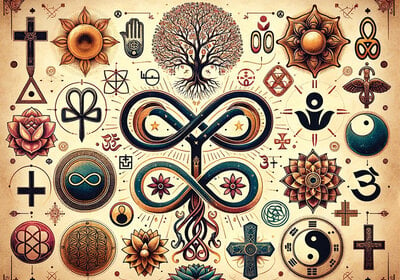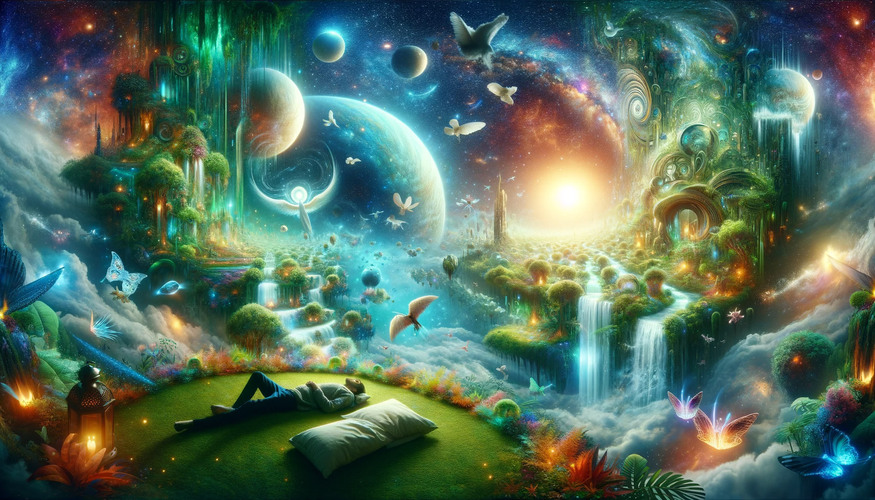
Discover dreams and their true significance in our lives
For centuries, people have questioned the significance of dreams. Early civilizations regarded dreams as a means of communication between humans and gods. The Greeks and Romans believed that dreams could predict the future. Times have changed since then. Today, there are numerous theories about the meaning of dreams and their interpretation.
In this article, you will read about:
- The Characteristics and Importance of Dreaming
- The Impact and Function of Dreams
- What is a Dream Dictionary?
- 10 Fascinating Facts About Dreams
- Types of Dreams
- The Meaning of Common Dreams and Symbols
- Interpretation of Popular Dream Symbols
1. The Characteristics and Importance of Dreaming
The characteristics of dreams have long fascinated scientists and philosophers. However, only recently have dreams been subjected to rigorous scientific analysis. One of the most renowned dream researchers is the American psychiatrist John Allan Hobson, who in 1988 identified five fundamental characteristics of dreams:
- Dreams are often marked by intense emotions. Even if your waking life is relatively calm, it's quite normal to experience vivid dreams with extreme emotions. Whether it’s intense fear (being chased by a crazed axe-wielding murderer) or public humiliation (finding yourself naked on stage), Hobson’s research revealed that the three most common dream emotions are anxiety, fear, and surprise.
- Dreams are often disorganized and illogical. Certain parts of your conscious brain shut down during dreaming, allowing thoughts to run freely. As a result, dreams are filled with nonsensical scenarios and jumbled content that makes little to no sense upon waking.
- Dream content is accepted without question. According to Hobson, we generate strong emotions and perceptions within the dream world, which validate our experiences regardless of how strange they are. When dreaming, we lack the ability to logically reflect or overcome emotions.
- Dreams often involve bizarre sensory experiences. You might feel the sensation of flying, falling, or even running in slow motion.
- Dreams are often difficult to remember. REM sleep is characterized by low levels of serotonin and high levels of acetylcholine, which make it harder to store dreams in short-term memory. In fact, dream research suggests that 95% of regular dreams are forgotten upon waking. However, you can improve dream recall by intensifying the dream experience and making conscious recollection a habit.
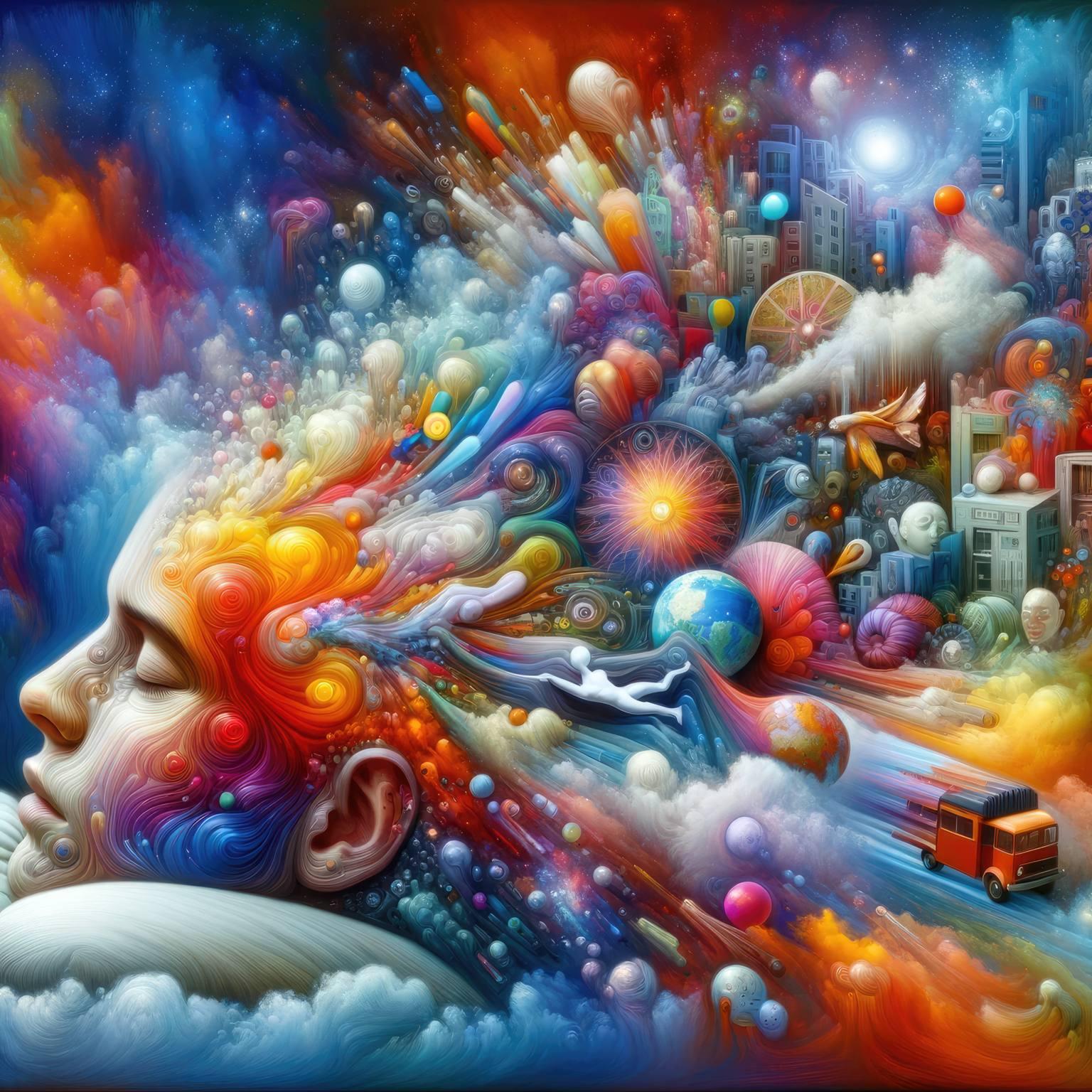 Abstract visualization of dreams inspired by their characteristics and meaning. Source: DUBLEZ
Abstract visualization of dreams inspired by their characteristics and meaning. Source: DUBLEZ
What actually happens when we dream? Dreams are essentially stories we play out in our minds during the night. They can mimic real-life situations or be entirely abstract. Scientists estimate that we have about 3–6 dreams per night, and around 95% of these dreams are forgotten by the next morning.
Although most dreams are forgotten, this doesn’t mean they’re unimportant. Quite the opposite—REM sleep dreaming is the only time the brain is free from norepinephrine, a molecule associated with anxiety. This means that key emotional and memory-related parts of the brain are active during REM sleep. Dreaming allows the brain to process potentially distressing or anxiety-inducing memories in a safe, emotion-free environment. Thus, dreaming has the potential to reduce emotional intensity and helps process events in a more rational way.
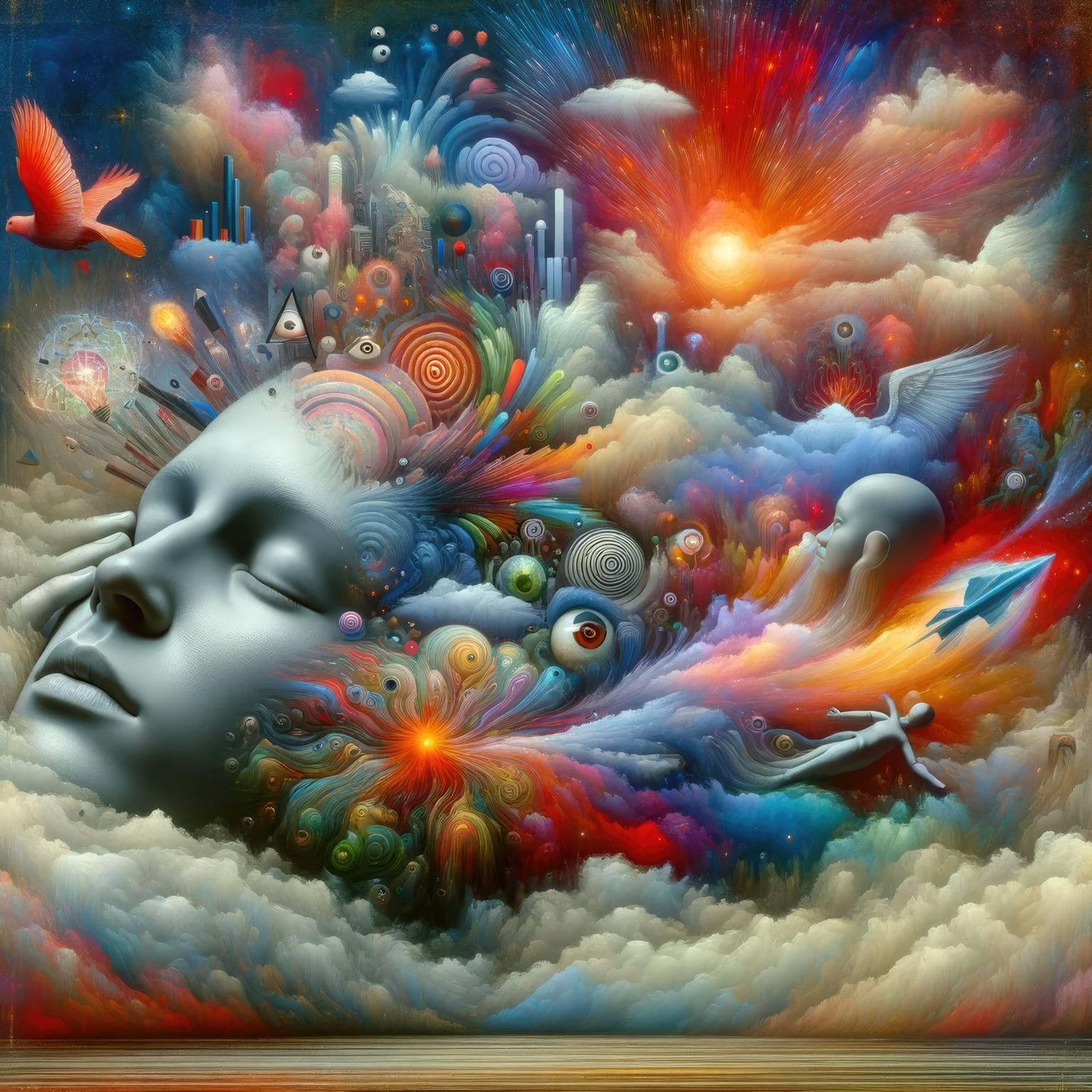
Abstract visualization of dreams inspired by their characteristics and meaning. Source: DUBLEZ
2. The Impact and Function of Dreams
Why do we dream? And why do we experience different types of dreams at different times? Many scientists argue that dreams serve to alleviate emotional stress. From this perspective, dreams represent troubling scenarios reminiscent of life events and help the dreamer heal from them during sleep.
Sigmund Freud considered dreaming to be an expression of repressed conflicts or desires, often of a sexual nature. Carl Jung took a more systematic approach, explaining dreams as a type of energy, innate emotions, or thoughts governed by the deep subconscious. Modern psychologists and neuroscientists have delved deeper into the technicalities, speculating that dreaming is the brain’s way of discarding excess data, consolidating important information, and keeping us alert to potential dangers.
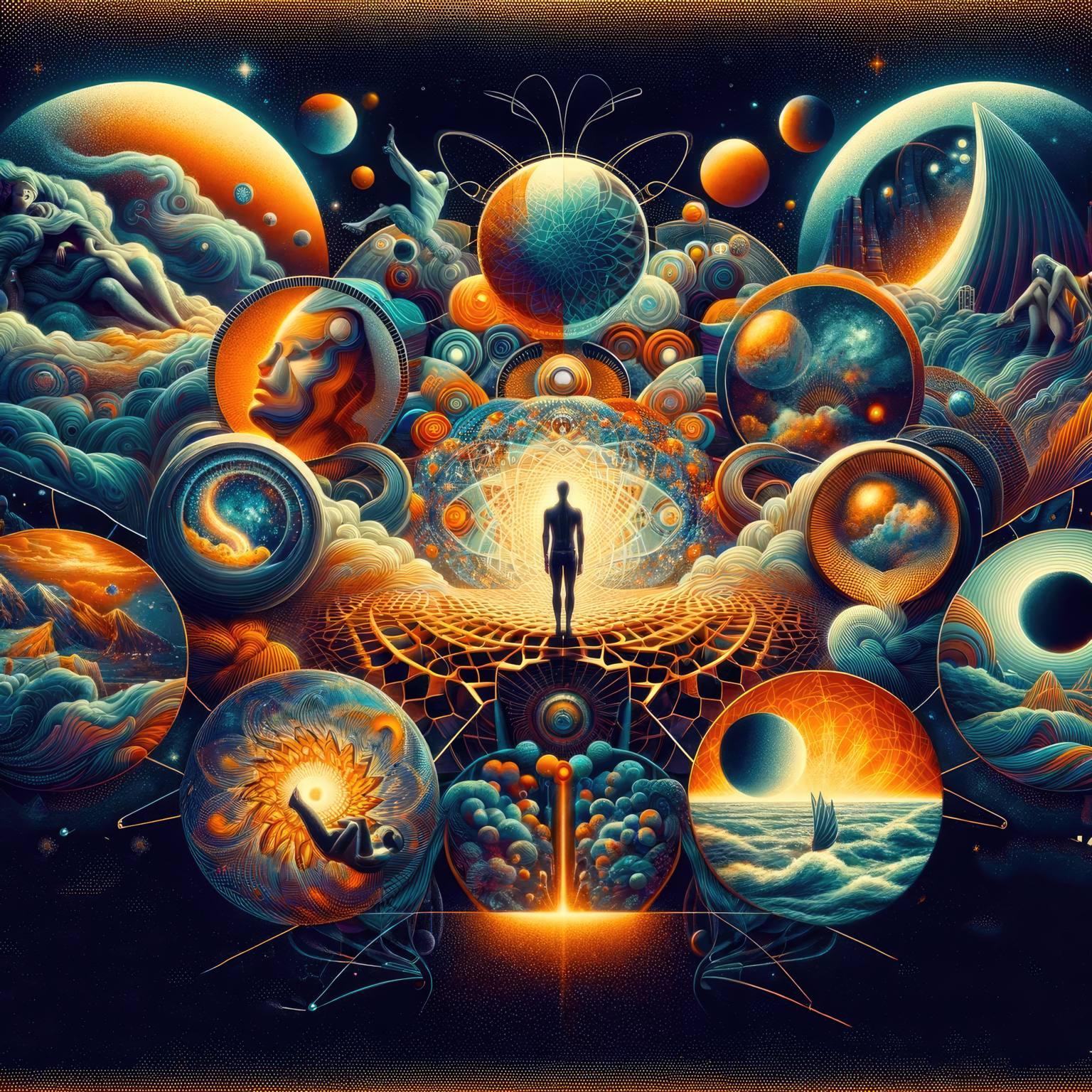
Illustration of dream types in a surreal abstract style. Source: DUBLEZ
A recent study by researchers at the University of Alberta compared the short-term effects of nightmares, defining them as:
- Primarily involving fear and harm
- Existential dreams, where themes of sadness and separation are prominent
- Transcendent dreams, focused on "awe and achievement"
The study results suggest that existential dreams are most closely related to self-awareness, addressing profound topics such as spiritual beliefs or the meaning of life.
After transcendent (supernatural) dreams, the dreamer is most likely to experience a sense of spiritual release, which means they feel liberated from life’s entanglements.
Contrary to popular belief about the effects of nightmares, the study’s results suggest that nightmares do not significantly affect thoughts or emotions during waking hours. Certain events, such as trauma, influence dreaming and increase the frequency of nightmares. However, nightmares can also be beneficial, allowing the dreamer to adopt a defensive stance to cope with the situation through dreaming.
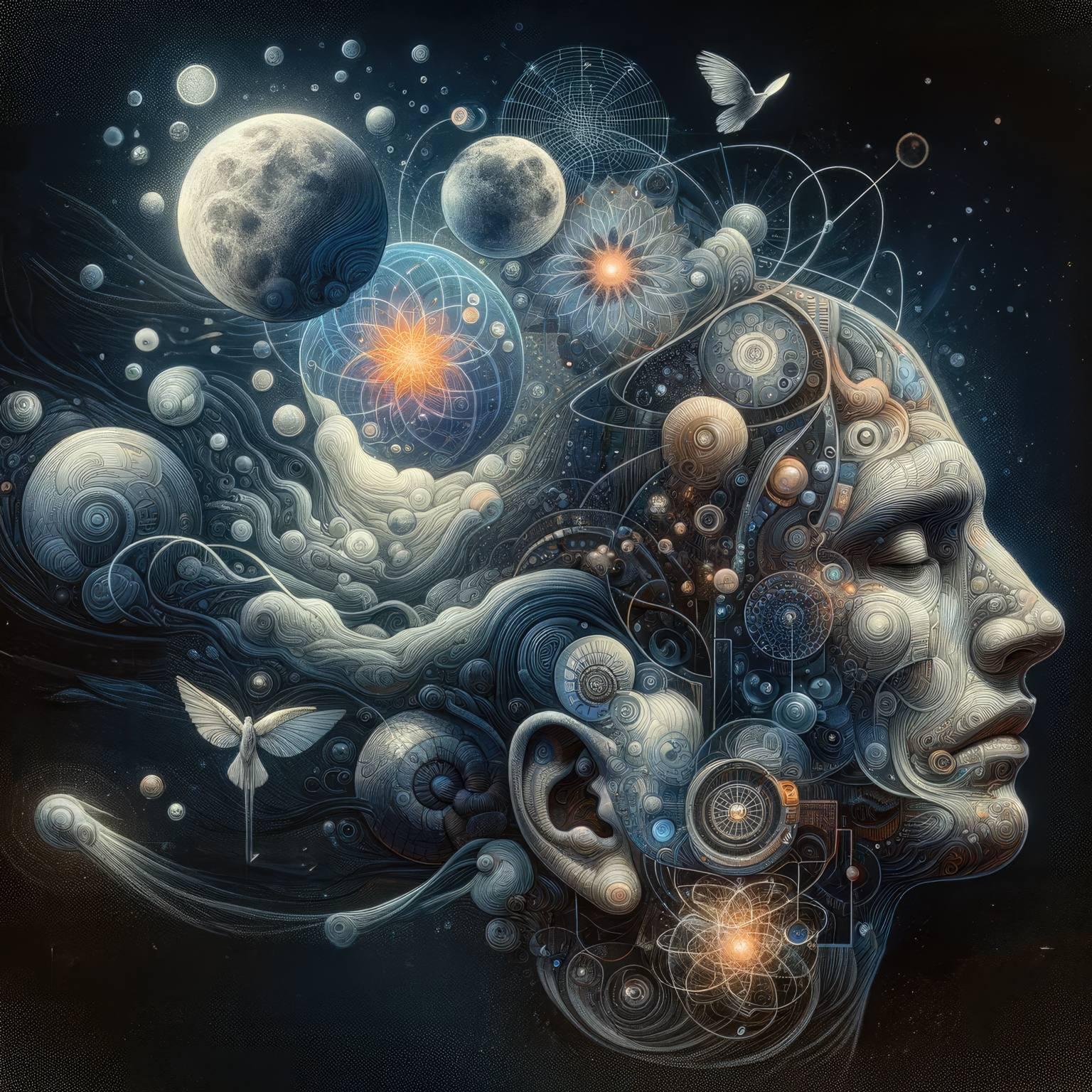
Illustration of dream types in a surreal abstract style. Source: DUBLEZ
3. What is a Dream Dictionary?
A dream dictionary, or book of dreams, is a comprehensive analysis of almost every dream we experience. For ease of use, these dreams are categorized alphabetically from A to Z.
A dream dictionary is a tool that helps dreamers interpret their dreams without requiring scientific knowledge. Dreams can have different interpretations for different people depending on their waking life experiences, emotions, and the people around them.
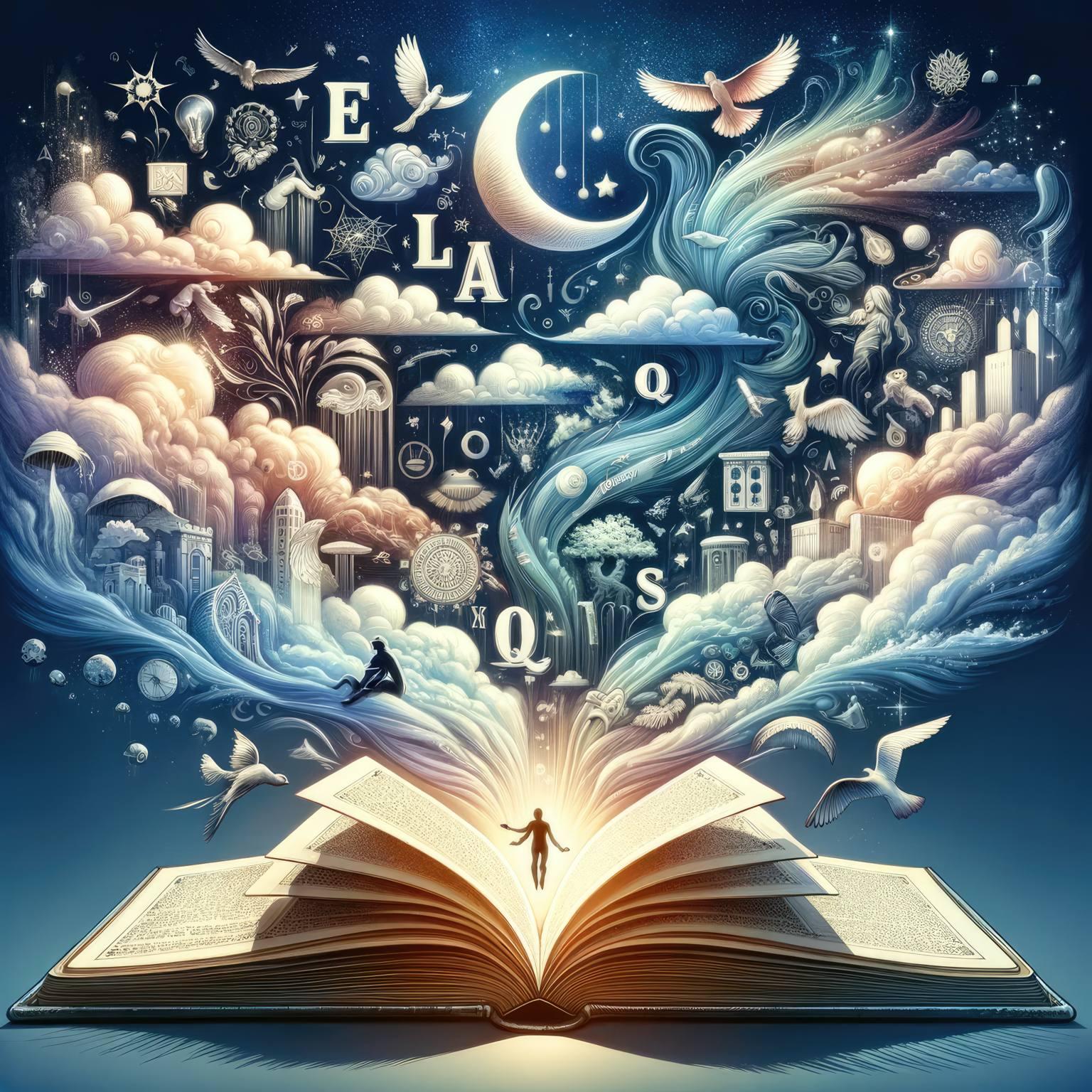
Illustration of a dream dictionary. Source: DUBLEZ
While scientists continue to debate the authenticity of dream meanings, they believe that every dream is a message from our subconscious—encoded in metaphors, symbols, or images. Paying attention to these messages can certainly "help" in your waking life, but interpreting them correctly is key. Remembering and recording your dreams can be a challenge, but having all the details makes decoding them easier.
Moreover, the benefits of dream interpretation are substantial. It allows you to connect with your subconscious and harness untapped potential. By trying to write down your dreams each morning and interpreting them, you can unlock personal growth, gain future insights, or receive warnings.
4. 10 Fascinating Facts About Dreams
- Both blind people and animals can dream.
- Everyone dreams, but most people don’t remember their dreams the next day.
- The oldest recorded dream dictionary is 4,000 years old.
- Some people dream in black and white.
- Paralysis can occur during dreaming.
- It’s possible to learn how to control your dreams—this is known as lucid dreaming.
- Babies don’t dream about themselves until they’re at least three years old.
- Negative dreams are far more common than positive ones.
- Men and women dream differently.
- There are several universal dream themes.
To reduce nightmares and unpleasant dreams, we can use the magical power of dreamcatchers, which can simply be placed in the room where you sleep. We explored dreamcatchers in detail in a dedicated article: Dreamcatcher - Talisman or Decoration?
At DUBLEZ, dreamcatchers are very popular, and we craft them for you in various styles:
5. Types of Dreams
There are many types of dreams, including healing dreams, prophetic dreams, recurring dreams, lucid dreams, and nightmares. During one sleep session, you can have multiple dreams that may last as little as 10 seconds or as long as 45 minutes (or even longer in the case of lucid dreaming).
Here are some types of dreams we might experience:
- False Awakening Dreams - These dreams occur when the dreamer believes they have woken up, but they are still dreaming. False awakening dreams are a hybrid state that overlaps wakefulness and sleep, often linked with sleep paralysis or lucid dreams.
- Healing Dreams - Healing dreams involve the dreamer having the ability to heal others or possess supernatural powers, such as telekinesis or telepathy. These dreams can bring a sense of balance and reconciliation, helping you achieve a state of peace or purpose through your subconscious mind.
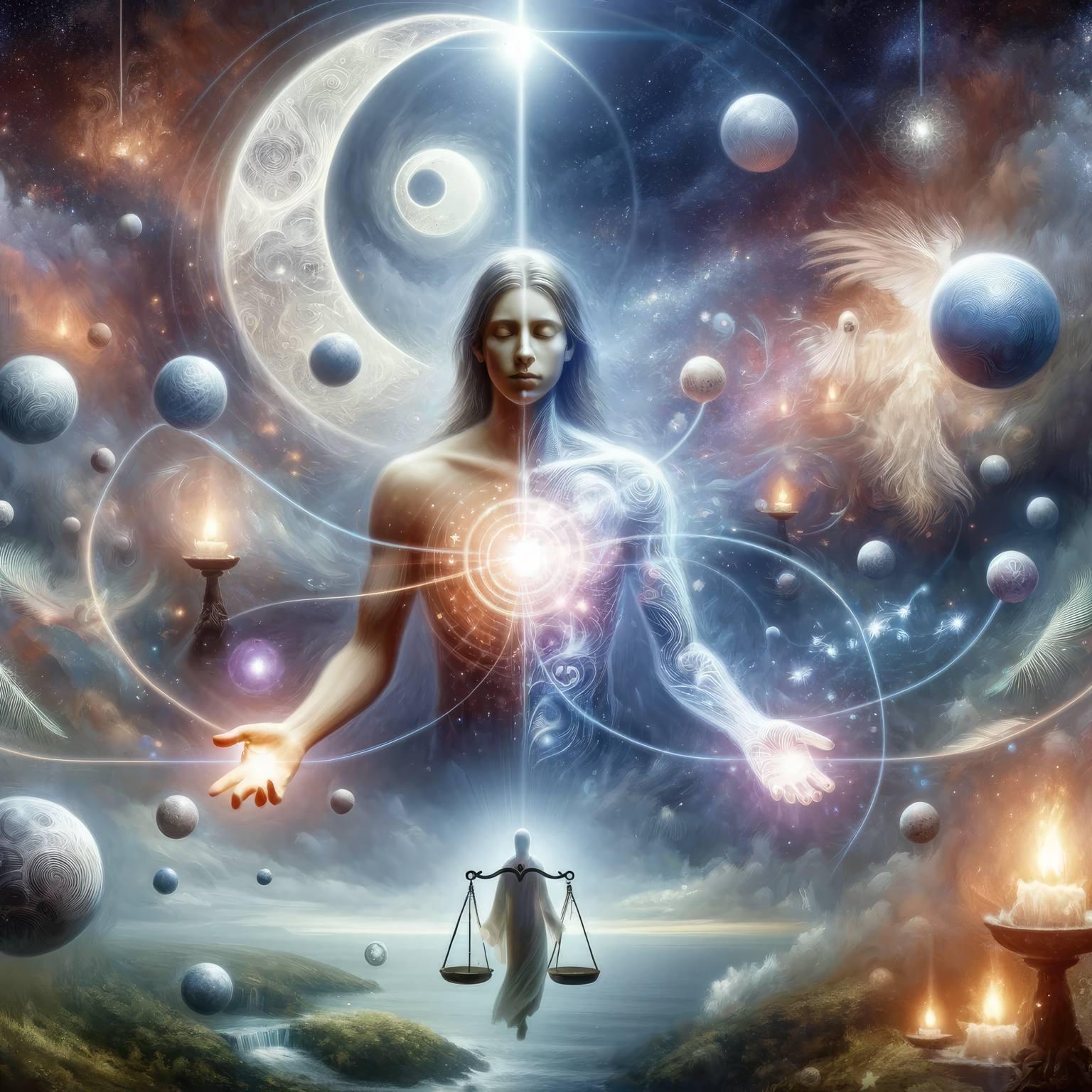
Illustration of a healing dream concept, where the dreamer demonstrates supernatural abilities. Source: DUBLEZ
- Lucid Dreams - A lucid dream is one where the sleeper realizes they are dreaming and may retain some control over their body and thoughts within the dream.
- Nightmares - Nightmares are fear-inducing dreams. This type of dream state allows the brain to process daily stressors. Common causes of nightmares include poor eating habits, past traumatic events, illness, sleep deprivation, sleep disorders, or certain medications.
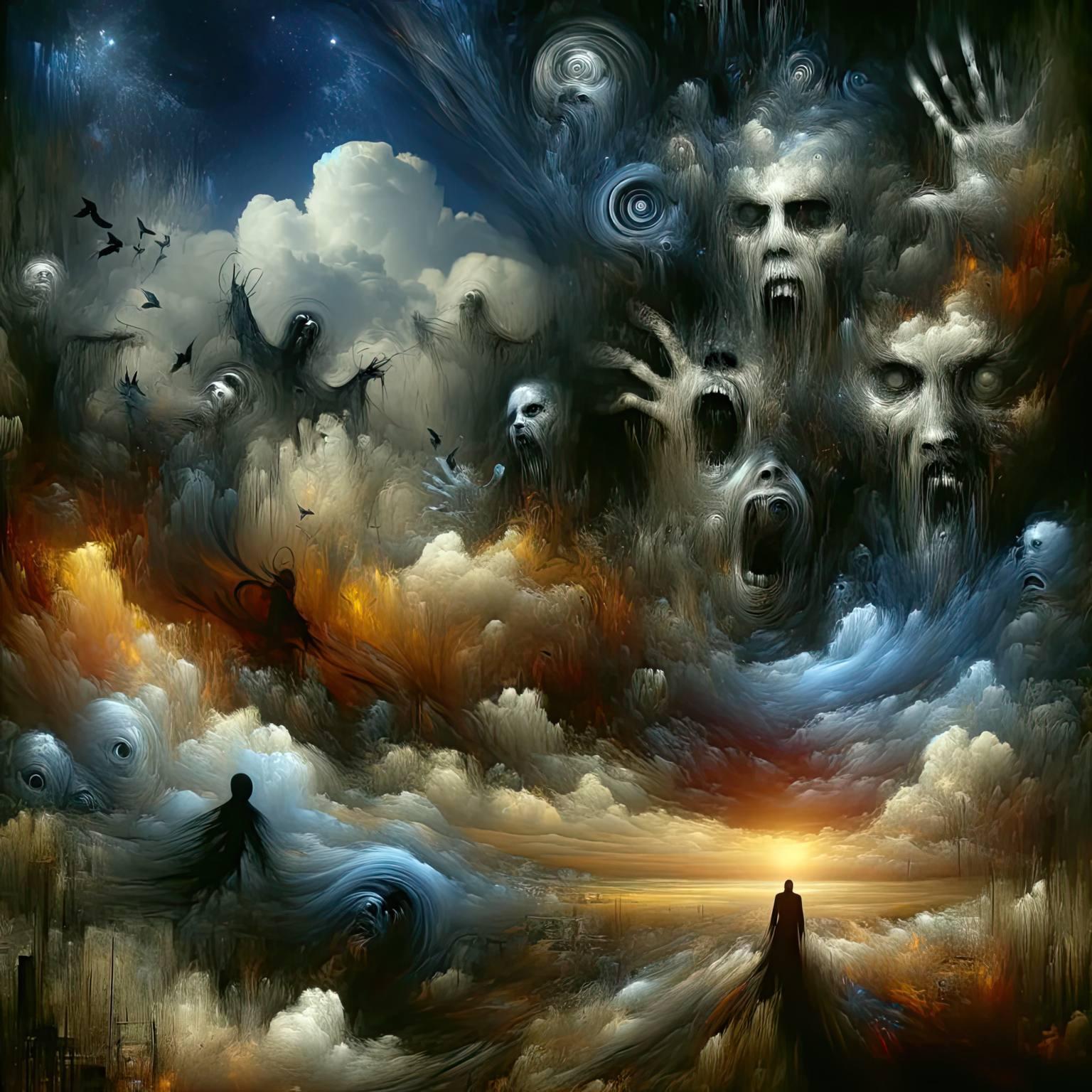 Abstract illustration of a nightmare. Source: DUBLEZ
Abstract illustration of a nightmare. Source: DUBLEZ
- Prophetic Dreams - In prophetic dreams, people see future events before they happen in real life. Some believe these dreams indicate that the person has predicted the future, while others think prophetic dreams are the subconscious preparing you for a likely outcome.
- Recurring Dreams - Recurring dreams involve experiencing the same or similar images or feelings repeatedly during sleep. They can also occur as recurring nightmares. Various theories suggest recurring dreams stem from avoiding risks, fears, or unresolved issues.
- Daydreams - These are a series of thoughts that distract you from the outside world, making you less aware of your surroundings. Daydreams occur during wakefulness and are produced by the brain’s default network mode in response to a lack of stimulation. Types of daydreams include dysphoric, escapist, fantasy, ruminative, and visualization dreams.
6. The Meaning of Common Dreams
There are numerous themes in dreams, each with various meanings and interpretations depending on the experience.
- Being Chased - Dreaming of being chased might indicate that you’re avoiding a problem instead of confronting and solving it. These problems could involve deadlines, financial decisions, or relationship issues.
 A man being chased in a dream. Source: DUBLEZ
A man being chased in a dream. Source: DUBLEZ
- Death - Dreaming of your own death or the death of a loved one may signify a change or transformation happening in your life.
- Falling - Falling from a surface or through the air is a common dream theme. Some scientists believe falling in dreams may signal anxiety, a lack of control, a loss of power, or feeling overwhelmed.
 Illustration of a dream where a person is falling from a tall building. Source: DUBLEZ
Illustration of a dream where a person is falling from a tall building. Source: DUBLEZ
- Flying - Not all dream themes are rooted in insecurity or anxiety. Dreaming of flying may indicate feelings of power or control, allowing you to gain a broader perspective on things.
- Loose Teeth - Dreaming of losing teeth may signal that you feel anxious or insecure about a certain situation. It could relate to an unpleasant event, conflict with someone in your life, or facing a tough decision.
- Being Naked in Public - Dreaming of being in a public space without clothes may indicate feeling particularly vulnerable, unprotected, or at risk.
- Sex - Dreaming of sex may signal a desire for a sense of security or emotional closeness.
7. Interpretation of Popular Dream Symbols
- Baby - Dreaming of expecting a baby may signal that it’s time to mature and prepare for a new beginning, whether in your personal or professional life.
- Hair - Dreaming of growing hair may indicate that you have an abundance of ideas and are a highly creative person. You should pursue activities that allow you to express your artistic self.
- Ring - Dreaming of wearing an engagement or wedding ring might mean someone close to you needs your help. You should focus on yourself first before prioritizing others.
- Teeth - Loose, decayed, falling, or missing teeth can indicate that a family member or close friend is seriously ill or near death.
 Illustration of a dream where someone is losing their teeth. Source: DUBLEZ
Illustration of a dream where someone is losing their teeth. Source: DUBLEZ
- Watch - Dreaming of a watch usually represents being overly strict with rules and schedules. Let things take their course and try to live each day to the fullest.
- Toilet - Dreaming of a toilet represents negative traits you should change; otherwise, your friends might start avoiding you.
- Book - Dreaming of a book means you yearn for knowledge and self-discovery, even if you currently lack the courage to pursue it.
- Horse - Dreaming of a horse, a majestic and powerful animal, may indicate that you’re suppressing inner strength and submitting too much to someone.
- Earrings - This symbol suggests you’ll soon experience success and financial improvement.
- Bear - Dreaming of being chased by a bear likely means you’re avoiding problems you’ve been neglecting for a long time.














































































